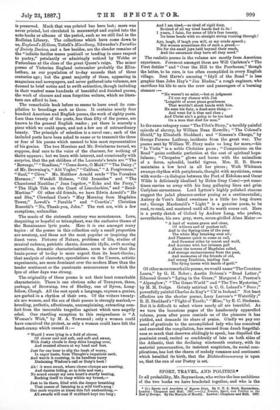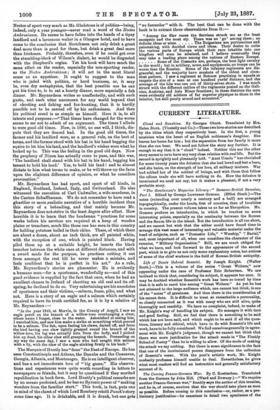SPORT, TRAVEL, AND POLITICS.* Is all probability, Mr. Reynardson, who
writes the less ambitious of the two books we have bracketed together, and who is the
• (1.) Sport, and Anecdotes of Bygone Days. By C. T. S. Birch Beynardson. London Chapman and Hall. 1887—(2.) Travels, 8rt, and Polittes in the Rest of Europe. By the Marquis of Neatly. London : Chapman and Hall. 1887. Nestor of sport very much as Mr. Gladstone is of politics—being, indeed, only a year younger—never read a word of the Nodes Ambrosiunce. He seems to have fallen into the hands of a tipsy landlord and a larcenous waiter in a Glasgow hotel, and to have come to the conclusion that Scotchmen not only drink a great deal more than is good for them, but drink a great deal more than Irishmen. Probably, therefore, even if he could get over the stumbling-block of Wilson's dialect, he would be disgusted with the Shepherd's orgies. Yet his book will have much the same effect on the reader, especially the non-sporting reader, as the Nodes Ainbrosiance ; it will act in the most literal sense as an appetiser. It ought to suggest to the man who is jaded with politics, or hard business, or, it may be, even dry metaphysics, that the best possible use he can put his time to, is to eat a hearty dinner, more especially a fish dinner. Mr. Reynardson writes so unaffectedly, and with such gusto, and such utter unconcern for any world beyond that of shooting and fishing and fox-hunting, that it is hardly possible not to be carried off by his enthusiasm. And then his political creed is as simple as himself. Here it is, to all intents and purposes :—" That times have changed for the worse seems to me not to admit of an argument. The times I allude to were good old times. Now, in 1886, no one will, I think, dis- pute that they are deuced bad. In the good old times, the farmer and his landlord were, as a general role, on the best of terms, and the farmer stood with his hat in his hand begging the squire to let him his land, and the landlord's wishes were what be looked op to. This was the feeling in the good old days. Now the prophecy of Nixon has actually come to pass, and this was, ' The landlord shall stand with his hat in his hand, begging his tenant to hold his land.' Yes, to hold his land ! and to almost dictate to him what terms to make, or he will throw up the farm upon the slightest difference of opinion, or what he considers provocation."
Mr. Reynardson has had sport, and sport of all kinds, in England, Scotland, Ireland, Italy, and Switzerland. He also witnessed the execution of Carl Cadwaller, a wife-murderer, in the Canton Schaffhausen. We do not remember to have read a ghastlier or more realistic narrative of a horrible incident than this story of a beheading, and that mainly because Mr. Reynardson does not strive in the least degree after effect. How horrible it is to learn that the headsman " practises for some weeks before his services are required at a heap of wooden plates or trenchers, much like those one has seen in this country for holding potatoes boiled in their skins. These, of which there are about a dozen, about an inch thick, are all painted white, with the exception of one, which is painted black. Having piled them up at a suitable height, he inserts the black trencher between the white ones at different distances, and with a sword made for the purpose, he practises cutting it out from amongst the rest till he never makes a mistake, and feels confident that he is perfbct in his art." As a rule, Mr. Reynardson's stories are pleasanter. He is evidently a humane man—for a sportsman, wonderfully so—and of this good evidence is supplied by the fact that once, when he had an excellent chance in Ireland of shooting an old seal and its off- spring, he declined to do so. Very entertaining are his anecdotes of sportsmen and their victims,—salmon, foxes, pike, and what not. Here is a story of an eagle and a salmon which certainly required to have its truth certified for, as it is by a relative of Mr. Reynardson :— " In the year 1848, at Mervin, in the County of Argyll, I saw an eagle perch on the branch of a willow-tree overhanging a river, whose name I forget, close to the water. Astonished at seeing him, I watched him, and saw him make a strike at something which proved to be a salmon. The fish, upon feeling his claws, darted off, and from the bird having one claw tightly grasped round the branch of the willow-tree, his leg was actually torn from the body, and I pinked him up dead, his other claw still grasping the branch. Proceeding on my way the same day, I saw a man who had caught this salmon with a fly, with the claw of the eagle sticking firmly in his back."
The Marquis of lInntly has "done" the East of Europe. He has seen Constantinople and Athens, the Danube and the Caucasus, Georgia, Albania, and Montenegro. He is an intelligent observer, and has a not immoderate love of " big game." His observa- tions and experiences were quite worth recording in letters to newspapers or friends, but it may be questioned if they merited republication in book form. Lord Hnntly'e political remarks are by no means profound, and he has no Byronic power of "making wonders from the familiar start." This book, in fact, puts one in mind of the claret of which Lord Rosebery retold Punch's story some time ago. It is drinkable, and it is drank, but one gets
"no forrarder " with it. The best that can be done with the book is to extract three observations from it :—
" Among the Slav races the Servians struck me as the least energetic and the most sly. There was no ' go' among them ; no definite ideas or aims. . . . . . The Bulgarians are pertinacious and painstaking, with decided views and ideas. Their desire to unite the various parts of Europe which their race inhabits into one kingdom will soon be attained, and I believe eventually they may take a leading place among the nations of Eastern Europe. Some of the Cossacks are, perhaps, the best light cavalry in the world ; but in artillery, arms, and equipments, no troops can be worse than the Russian. Some of the infantry regiments are dis- graoefal, and the majority have muskets of the oldest and clam- sieet pattern. I saw a regiment at Batonm practising in squads at targets the size of a Mall at one hundred yards' distance, and the average of the hits was one out of thirty-seven shots. I was much struck with the different calibre of the regiments posted on the Gali- cian, Austrian, and Asia Minor frontiers ; in these districts the men were evidently old soldiers of far superior physique to those in the interior, bat still poorly armed and accoutred."



































 Previous page
Previous page